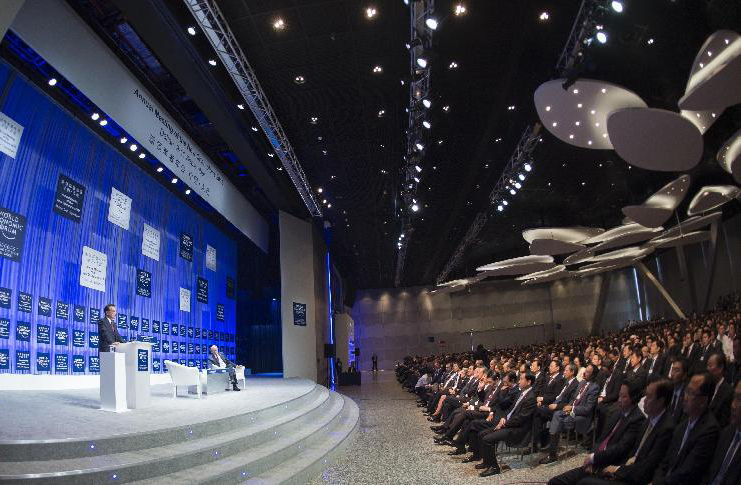Scholars: China still serves as engine of world economy

On Sept. 10, Chinese Premier Li Keqiang addresses the opening ceremony of the ninth Annual Meeting of the New Champions 2015 of the World Economic Forum in Dalian, Liaoning Province.
On Sept. 11, the three-day ninth Annual Meeting of the New Champions 2015 of the World Economic Forum, also known as “Summer Davos” closed in Dalian, China. More than 1,500 leading politicians, businessmen and scholars from more than 90 nations exchanged ideas at the meeting and outlined a blueprint for world economic growth.
This year’s meeting focused on six themes—transformational science, industry disruption, economic uncertainty, China’s “new normal," environmental boundaries and humanism.
Some scholars said the forum conveyed a positive global message and in particular, China’s proposed reforms have brought hope to people around the world.
Economic deleveraging
Jia Jinjing, director of the Macroeconomic Research Department of the Chongyang Institute for Financial Studies at Renmin University of China, said the Chinese economy has a solid foundation, and its structure is being upgraded. He said, the fluctuation of the macroeconomic data for the third quarter is related to the global deflation and national restructuring. However, it still shows a trend of rapid growth, he added.
Official statistics show that China has contributed about 30 percent to world economic growth, which proves that China is a driving force of rather than a source of risk to the world economy.
Some scholars pointed out that the biggest potential for economic growth in China lies in reform and innovation. At present, the on-going structural reform is creating dividends. “The restructuring will phase out highly polluting enterprises to make space for those with better prospects,” said Ding Jianping, director of the Research Center for Modern Finance at Shanghai University of Finance and Economics.
With increased government support for entrepreneurship and innovation, China is facing more opportunities than challenges, Ding said. “Economic recovery needs support from technological innovation because innovation can present new opportunities,” he said. He noted that technological innovation requires funding, which in turn will promote venture investment and bond financing, and thus drive the development of the stock market.
After the outbreak of the 2008 financial crisis, most developed countries began to deleverage. By contrast, China obtained a high leverage ratio in a short time from 2009 to 2010, and its economic growth rate reached about 10 percent. However, it now is decreasing the leverage ratio, and its economy has settled into a growth rate of about 7 percent, which is referred to as the “new normal.” Financial investment is being replaced by easy and proactive monetary policy. Chinese banks are attempting to increase the liquidity of deposits, thus stimulating investment in innovation by cutting the reserve requirement ratio and interest rate.
International industrial cooperation
Many attendees to the forum expressed their appreciation and expectation for international industrial cooperation, which was proposed by China. They discussed how enterprises in other countries can participate in the process and make their own contributions.
This proposition is of pragmatic meaning and conforms to the principle of mutual benefit, said Klaus Schwab, founder and executive chairman of the World Economic Forum. “It will benefit nations that are undergoing industrialization as well as developed countries,” he said.
To this end, all countries should promote structural reform at home while strengthening international cooperation at abroad, some scholars suggested.
Chen Fengying, director of the Institute of World Economic Studies at the China Institutes of Contemporary International Relations, explained the reasons why China advocates international industrial cooperation.
Above all, there is an imbalance of industrial development around the world, and for emerging markets and developing countries, domestic manufacturing needs to introduce foreign technology and products, she said. “Thus, it is an optimal choice for China to develop mid-tech products with good quality and competitive prices,” Chen said.
Also, infrastructure still needs to be improved in many nations, she said.
“Cooperation in infrastructure construction is mutually beneficial to all countries and is a significant part of international industrial cooperation, Chen said. “International industrial cooperation is in line with economic development trends and in the interest of every nation. It will inject new energy into the world economy.”
Zhang Junrong and Niu Dongjie are reporters at the Chinese Social Sciences Today.

 PRINT
PRINT CLOSE
CLOSE